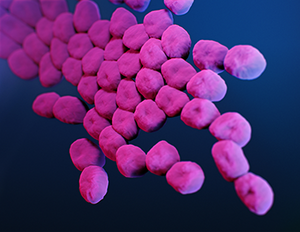Acinetobacter
<translate>
General information about Acinetobacter[edit]
- Acinetobacter [asz−in−ée−toe–back−ter] is a group of bacteria commonly found in soil and water.
- While there are many types or “species” of Acinetobacter and all can cause human disease, Acinetobacter baumannii [asz−in−ée−toe–back−ter boe-maa-nee-ie] accounts for about 80% of reported infections.
- Outbreaks of Acinetobacter infections typically occur in intensive care units and healthcare settings housing very ill patients. Acinetobacter infections rarely occur outside of healthcare settings.

Acinetobacter
Symptoms of Acinetobacter infection[edit]
- Acinetobacter causes a variety of diseases, ranging from pneumonia to serious blood or wound infections, and the symptoms vary depending on the disease.
- Acinetobacter may also “colonize” or live in a patient without causing infection or symptoms, especially in tracheostomy sites or open wounds.
For more images of this bacterium, search the Public Health Image Library
Transmission of Acinetobacter infection[edit]
- Acinetobacter poses very little risk to healthy people.
- Acinetobacter can be spread to susceptible persons by person-to-person contact or contact with contaminated surfaces.
Immune system compromise[edit]
- People who have weakened immune systems, chronic lung disease, or diabetes may be more susceptible to infections with Acinetobacter.
- Hospitalized patients, especially very ill patients on a ventilator, those with a prolonged hospital stay, those who have open wounds, or any person with invasive devices like urinary catheters are also at greater risk for Acinetobacter infection.
Prevention of Acinetobacter infection[edit]
- Acinetobacter can live on the skin and may survive in the environment for several days.
- Careful attention to infection control procedures, such as hand hygiene and environmental cleaning, can reduce the risk of transmission.
Treatment of Acinetobacter infection[edit]
- Acinetobacter is often resistant to many commonly prescribed antibiotics.
- Acinetobacter infection typically occurs in ill patients and can either cause or contribute to death in these patients.
- Acinetobacter infections are generally treated with antibiotics.
Culture and sensitivity[edit]
- Culture and sensitivity is done to determine which are active against the germ.
- The provider will then select an antibiotic based on the activity of the antibiotic and other factors, like potential side effects or interactions with other drugs.
Antibiotic resistance[edit]
Unfortunately, many Acinetobacter germs are resistant to many antibiotics, including carbapenems, which makes them difficult to treat with available antibiotics. A-Z index of infectious diseases | Glossary of infection control | Glossary of vaccines
| Infectious disease and microbiology | ||||||||||||||||
|---|---|---|---|---|---|---|---|---|---|---|---|---|---|---|---|---|
|
</translate>
Ad. Transform your life with W8MD's Budget GLP-1 injections from $75


W8MD offers a medical weight loss program to lose weight in Philadelphia. Our physician-supervised medical weight loss provides:
- Weight loss injections in NYC (generic and brand names):
- Zepbound / Mounjaro, Wegovy / Ozempic, Saxenda
- Most insurances accepted or discounted self-pay rates. We will obtain insurance prior authorizations if needed.
- Generic GLP1 weight loss injections from $75 for the starting dose.
- Also offer prescription weight loss medications including Phentermine, Qsymia, Diethylpropion, Contrave etc.
NYC weight loss doctor appointmentsNYC weight loss doctor appointments
Start your NYC weight loss journey today at our NYC medical weight loss and Philadelphia medical weight loss clinics.
- Call 718-946-5500 to lose weight in NYC or for medical weight loss in Philadelphia 215-676-2334.
- Tags:NYC medical weight loss, Philadelphia lose weight Zepbound NYC, Budget GLP1 weight loss injections, Wegovy Philadelphia, Wegovy NYC, Philadelphia medical weight loss, Brookly weight loss and Wegovy NYC
|
WikiMD's Wellness Encyclopedia |
| Let Food Be Thy Medicine Medicine Thy Food - Hippocrates |
Medical Disclaimer: WikiMD is not a substitute for professional medical advice. The information on WikiMD is provided as an information resource only, may be incorrect, outdated or misleading, and is not to be used or relied on for any diagnostic or treatment purposes. Please consult your health care provider before making any healthcare decisions or for guidance about a specific medical condition. WikiMD expressly disclaims responsibility, and shall have no liability, for any damages, loss, injury, or liability whatsoever suffered as a result of your reliance on the information contained in this site. By visiting this site you agree to the foregoing terms and conditions, which may from time to time be changed or supplemented by WikiMD. If you do not agree to the foregoing terms and conditions, you should not enter or use this site. See full disclaimer.
Credits:Most images are courtesy of Wikimedia commons, and templates, categories Wikipedia, licensed under CC BY SA or similar.
Translate this page: - East Asian
中文,
日本,
한국어,
South Asian
हिन्दी,
தமிழ்,
తెలుగు,
Urdu,
ಕನ್ನಡ,
Southeast Asian
Indonesian,
Vietnamese,
Thai,
မြန်မာဘာသာ,
বাংলা
European
español,
Deutsch,
français,
Greek,
português do Brasil,
polski,
română,
русский,
Nederlands,
norsk,
svenska,
suomi,
Italian
Middle Eastern & African
عربى,
Turkish,
Persian,
Hebrew,
Afrikaans,
isiZulu,
Kiswahili,
Other
Bulgarian,
Hungarian,
Czech,
Swedish,
മലയാളം,
मराठी,
ਪੰਜਾਬੀ,
ગુજરાતી,
Portuguese,
Ukrainian